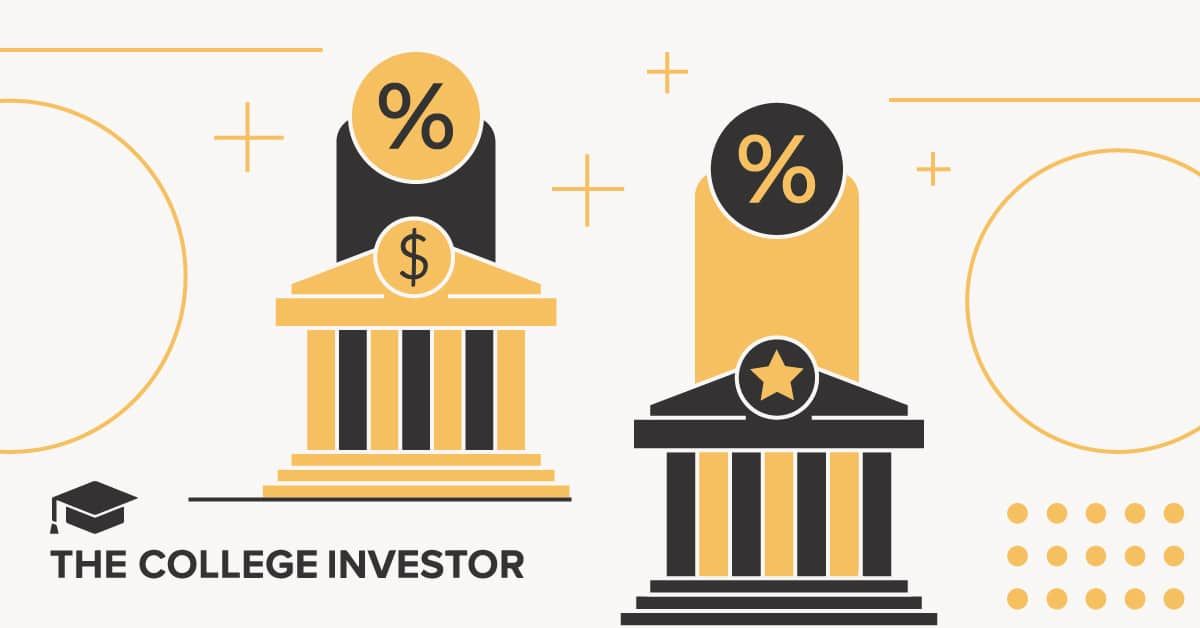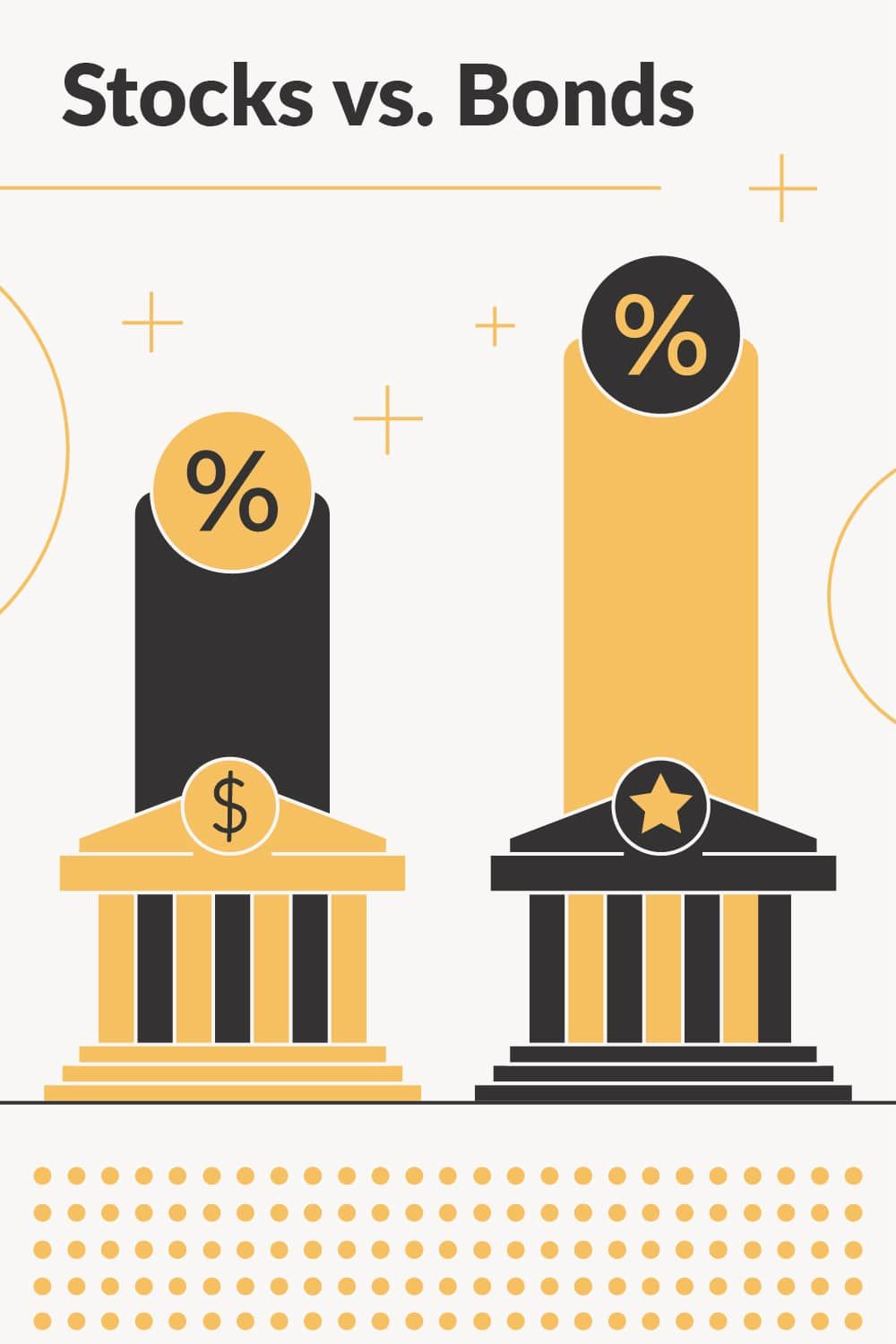
Stocks vs. bonds is the ultimate debate in portfolio asset allocation.
If you think you’re satisfied with everything in your investment portfolio, there’s probably something wrong with it. All financial assets have prices that move; they go up and down. A well-designed portfolio will allow you to take advantage of the upside volatility while protecting you from the downside. That is why most modern investment portfolios contain stocks and bonds.
However, when stock prices are soaring, owning bonds can seem like a drag on the portfolio. On the other hand, when stock prices fall month after month, owning more bonds suddenly seems like a great idea.
Whether you favor the growth potential of stocks or the steadiness of bonds, both could have a place in your portfolio. Here is what you need to know about the differences between stocks and bonds.
What Are Stocks?
Stocks are a form of equity ownership. When you own a stock, you own a share of a company. As a partial owner of the company, you are entitled to a share of profits (dividends) that are distributed according to the rules set up by the company. Investing in stocks can help you to build wealth over time.
A stock’s value rises and falls over time based on the company’s current and future profitability outlook. Some companies, like General Mills and General Electric, have had publicly traded stocks for nearly a century. Other companies, like Pets.com, were publicly traded for just a few years.
Why Are
Stocks Viewed
As Risky?
The value of a stock isn’t perfectly tied to a company’s profitability, at least in the short term.
As a whole, investors may be willing to “overpay” for a company with high growth potential or they may underpay for companies that produce solid returns quarter after quarter.
Despite the volatility and unclear pricing, stocks tend to produce high returns (compared to other assets) over time.
You make money from stocks when the stock pays a dividend or when you sell the stock for a profit. If you don’t want to research and buy individual stocks, you can buy ETFs or mutual funds, which allow you to own hundreds of stocks with just one ticker symbol.
What Are Bonds?
Bonds are a type of loan from you to the government or a company. When you lend money, the borrowing institution agrees to repay the principal balance of the loan with interest.
Bonds are sometimes called fixed-income assets. They are referred to as fixed income because the borrower is expected to repay the loan on a fixed schedule over time.
If the borrower is good at repaying their debts (like the U.S. government), the interest rate on bonds they issue will tend to be low. That’s why Treasury bills (T-bills), and Treasury notes tend to have low-interest rates.
I bonds, which are also issued by the government, have elevated interest rates right now because inflation is high. Often, I bonds have rates lower than those on T-bills or other types of debt.
In addition to loaning money to the federal government, you can lend money to cities through municipal bonds, or to companies through corporate bonds. These tend to have higher interest rates, but the borrowers may be at a higher risk of default. If a corporation has a very high risk of defaulting on its loans, the bonds issued by the company are called junk bonds (or high-yield bonds if you’re feeling generous).
Of course, you can sell bonds on a secondary market to earn a capital gain or to free up more cash immediately. However, most investors like to hold bonds to earn income over time.
@thecollegeinvestor Can we get some Plain English with investing please?!? Follow for more. #investingexplained #investingforbeginners #stocks ♬ original sound - The College Investor
Which Is Better, Stocks Or Bonds?
Most investors will need to include both stocks and bonds in their portfolios to invest successfully.
Over time, stocks tend to have higher growth than bonds, but that doesn’t make stocks better than bonds.
Bonds produce steady income and have lower volatility than stocks. If you’re seeking to preserve your assets (and maybe make a little extra), bonds are superior to stocks.
Bonds provide more stability while stocks provide more growth potential. Both are important for investing success.
Are Stock And Bond Prices Correlated?
While bonds tend to have lower returns than stocks, bonds also have lower volatility on average. That means that bonds rarely rise or fall in value as much as stocks. Sometimes investment professionals will go so far as to say that bonds “keep a portfolio afloat” when stocks have particularly poor performance.
While bond prices move less than stock prices (on average), stock and bond prices tend to move in the same direction. Over the past 100 years, most of the time when stock prices fell, bond prices fell as well, just not as much. Likewise, when stock prices rise, bond prices tend to tick up.
However, there are several examples where stock and bond prices have moved in opposite directions. For example, between 2000 and 2003, stock prices fell precipitously when the dotcom bubble burst while bond markets rallied.
Although stock and bond prices move in the same direction much of the time, the volatility profiles of these asset classes allow investors to maintain a diverse asset allocation. This can lead to fewer loss years, and in some cases, even additional gains.
How Can I Get The Right Mix Of Stocks And Bonds?
Figuring out the right mix of stocks and bonds depends on your:
If you’re an experienced investor, you may know what asset mix you want to maintain. Maybe you’re aiming for an asset allocation of 20% bonds and 80% stocks or 40% bonds and 60% stocks.
Whatever mix you choose, you should rebalance your portfolio regularly (often once or twice per year) to maintain its target allocation.
If you want to automate rebalancing, M1 Finance is a great brokerage company that can do it for you.
However, less experienced investors may not know what the right mix is. The right mix for your best friend may not be the right mix for you.
These are three ways you can figure out the right blend of stocks and bonds:
1. Consult A Financial Planner
If you’re not sure how you should invest your money, you may want to consult a Certified Financial Planner (CFP). Personal Capital, Wealthfront, Betterment, and other companies all offer CFP consultations to paying customers.
Some financial planners will manage your money for you, while others may collect a fee in exchange for services rendered. Either way, the financial planner should offer guidance about a target asset allocation.
2. Use a Target Date Fund
Some target date funds are loaded with unnecessary fees, so you will need to be careful with this strategy. That said, if you are investing for retirement and you have access to low-cost target date funds, they can keep you invested in a suitable blend of stocks and bonds.
Typically, target date funds add more bonds as you get closer to your retirement age. This cuts back on volatility, but it allows you to keep a certain portion in stocks, so your money can continue to grow. Target date funds are not ideal inside taxable brokerage accounts.
3. Consider a Robo-Advisor
Robo-advisors are designed to efficiently manage assets for users. The sophisticated algorithms keep users at their target asset allocation while also minimizing taxes.
Robo-advisors such as Betterment or Wealthfront charge a small fee, and the fee may be worthwhile if you don’t care to manage your asset allocation on your own.
Favor Decision Over Perfection
You could spend a long time studying the markets to decide on the perfect mix of stocks and bonds, but you’ll never have the perfect blend for every scenario. Nonetheless, an imperfect decision with well-executed actions will almost always beat indecision.
A portfolio of stocks and bonds mixed with savings and investing over time has produced winning results for over 100 years.
You have time to figure out your stock to bond ratio, but you can’t get back time in the market.

Hannah is a wife, mom, and described personal finance geek. She excels with spreadsheets (and puns)! She regularly explores in-depth financial topics and enjoys looking at the latest tools and trends with money.
Editor: Claire Tak Reviewed by: Robert Farrington
